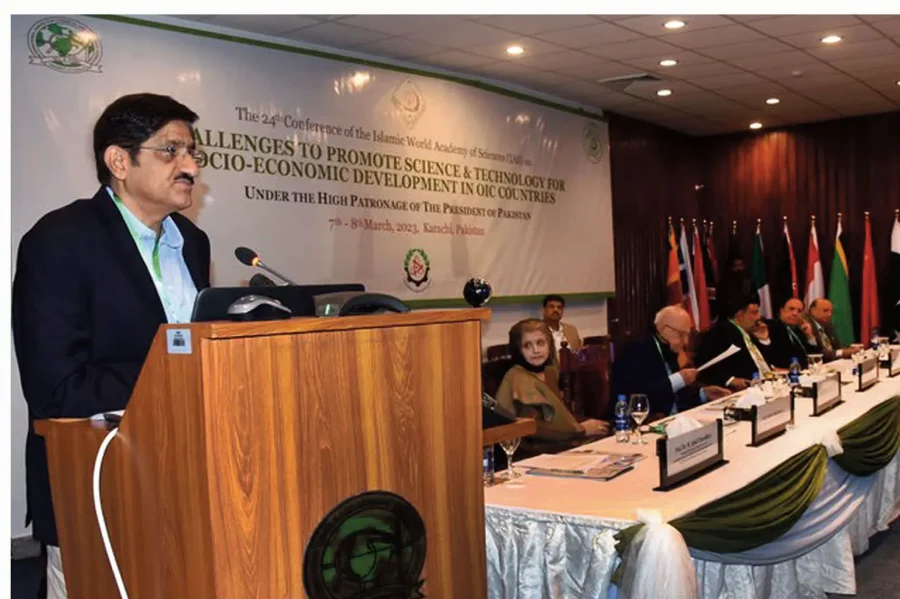Sindh Chief Minister Syed Murad Ali Shah has said that science and technology can be effectively used to solve enduring problems of poverty, food insecurity, and climate change in the Muslim world.
This he said while speaking at the Inaugural Ceremony of ‘The 24th Scientific Conference of Islamic World Academy of Sciences On ‘Challenges to Promote Science & Technology for Socio-Economic Development in OIC Countries’ organized by the University of Karachi.
The conference was attended by the President of The World Academy of Sciences Prof. Dr Adnan Badran, Prof. Dr Atta-ur-Rahman, Coordinator General COMSTECH Prof. Dr Muhammad Iqbal Choudhary, Vice Chancellor Karachi University & Patron-in-Chief of International Center for Chemical and Biological Sciences (ICCBS) Prof. Dr Khalid Mahmood Iraqi, Chairman Hussein Ebrahim Jamal Foundation Mr Aziz Latif Jamal, Chairperson Dr Panjwani Memorial Trust Ms Nadira Panjwani and Foreign and Local Delegates.Shah said that the major science event was an important step forward toward a better understanding of how science and technology can be effectively deployed to solve enduring problems of poverty, food insecurity, and climate change, in the Muslim world.
He said that the conference represented the growing interest and commitment of Muslim Ummah towards science and technology for human wellbeing. Being a professional Engineer, the CM said that he was very much aware of the importance of the need for research in science and technology. “It is only through the applications of science and technology that we can handle the enduring challenges of poverty, climate change, food insecurity, and increasing disease burdens, that world faces today.,” he said and added we needed to not only solve many local issues, but also partner with other nations in handling global challenges.
Murad Shah said that he was happy to see that our research institution, the International Center for Chemical and Biological Sciences constantly was striving to upgrade its capacity and human resources for frontier research and graduate training in chemical, biomedical and biochemical sciences. He added that the centre was an excellent example of the strong commitment of our private sector, federal and provincial governments, international donors, and our scientists and researchers toward the science and technology-based development in Pakistan.The CM said that his government has placed the ICCBS at the centre of its science and technology-based initiatives.
“Various departments of my government are working closely with the ICCBS management to establish research centres, upgrade the existing laboratory infrastructure of the province, as well to conduct some of the enduring issues in health and agriculture that the province is facing today,” he said.He added that the establishment of the Sindh Serology and DNA Forensic lab, the upgradation of the Chemico-bacterial lab in Karachi, and the establishment of the Traditional Medicine Research Center were the institutions where ICCBS was supporting the provincial government. Shah said that he was delighted to know that his idea of the establishment of a seamless learning platform for the universities has been implemented as the SIREN (Sindh Innovation, Research, and Education Network) by the ICCBS which connects leading universities of Sindh. “My government has also decided to declare five centres of the ICCBS as Sindh Health Care Research facilities in fields such as regenerative medicine, disease genomics, and pharmaceutical research,” he said.
Talking to the media the CM said that his government has enhanced the annual grant of the public sector universities by three times. “But the public-private partnership initiative of his government has produced the best results in education and health sectors,” he said.










